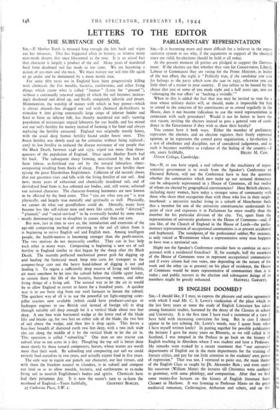Sta,—It is becoming more and more difficult for a believer
in the repre- sentative system to see why, if the arguments in support of the electorzl truce are valid, by-elections should be held at all today.
At the present moment all parties are pledged to support the Govern- ment: If the electors say that whether they vote for Conservative, Liberal, Labour or Communist they are voting for the Prime Minister, as leader of the war effort, the reply is "Perfectly true, if the candidate you vote for belongs to the party which won the seat in 1935, otherwise you are little short of a traitor to your country. If you refuse to be bound by the choice that you or some of you made eight and a half years ago, you are 'sabotaging the war effort' or 'backing a swindle."
When to this is added the fact that you may be invited to vote for a man whose military duties will, or should, make it impossible for him to attend to the concerns of his constituents or to attend regularly in the House, does it not become ridiculous to use the word representation in connexion with such procedure? Would it not be better to leave the seat vacant, inviting the electors instead to pass a general vote of confi- dence in the Government if they wish to show their loyalty?
You cannot have it both ways. Either the member of parliament represents the electors, and an election registers their freely expressed opinion, or he represents the central party organisation, a by-election is a test of obedience and discipline, not, of considered judgement, and as such it becomes worthless as evidence of the feeling of the country.—I


























 Previous page
Previous page